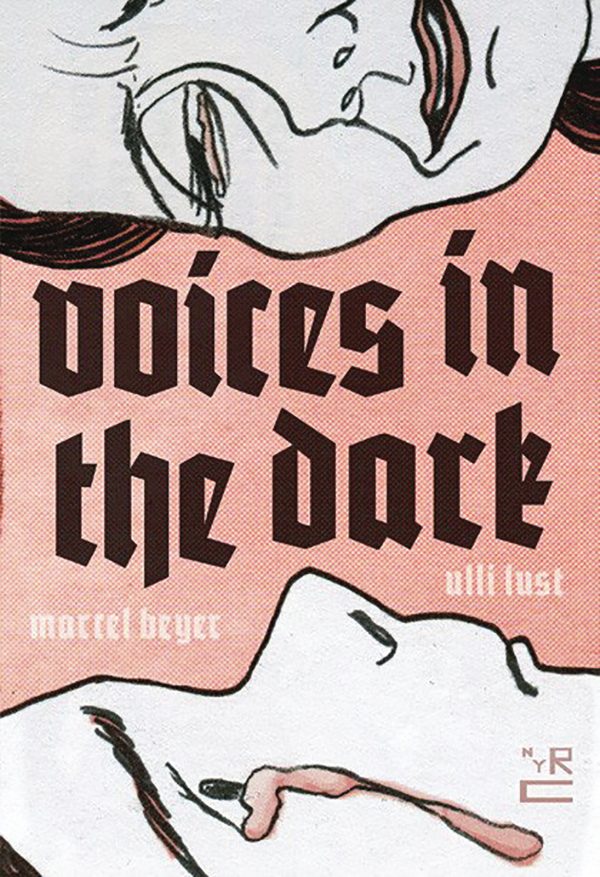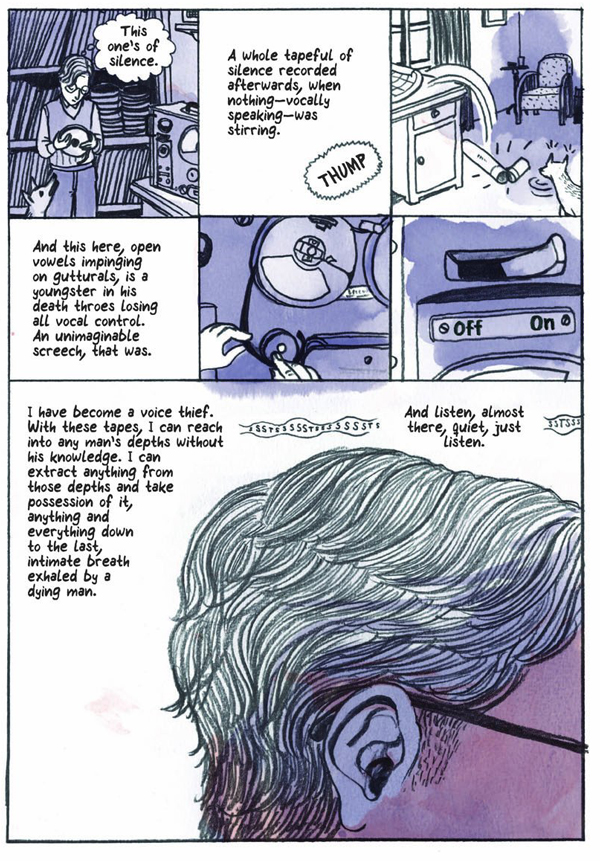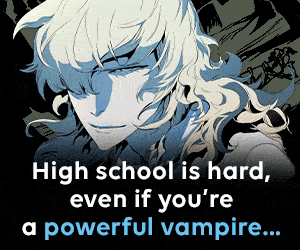The offerings from New York Review Comics have revealed one challenging work after another with curation of truly elevated works, but as impressive as they have all been, I don’t think any of them reaches the heights of Voices In The Dark, Ulli Lust’s adaptation of Marcel Beyer’s novel The Karnau Tapes. And, to be clear, these are dark, gloomy heights, emotionally powerful heights, honest and horrible heights that pull a layer back to reveal human nature in all its gruesomeness — not in a sadistic or even needlessly gruesome way, though. Just straightforward with enough delicacy that it takes pity on the reader for having to endure what it is showing us.
Taking place during the waning years of the Third Reich, the book darts between two characters and situations. One involves Hermann Karnau, a sound engineer who works for the Nazis in various recording projects that, as they progress, reach levels of research abstraction that separates the sounds captured in a clinical way from the humans making them.
The other centers around Helga, the oldest daughter of Joseph Goebbels, Hitler’s Minister of Propaganda. Helga’s life is a fanciful one, surrounded by five siblings who are kept oblivious to the horrors that surround their home and their father’s role in those. Helga’s growing up and gaining awareness, though, realizing that her placement in the family has put her in the difficult position of being a buffer zone between her siblings and her parents’ world. She desperately tries to spoon out a little reality here and there, while pushing back the trauma of full blown awareness. At the same time, she lets her sibling’s fantasy world wrap itself around her in an honest human attempt to save herself.
These two lives intertwine early on, with Karnau visiting Goebbels’s home. He and Helga make a connection and then move on. The story follows the increasingly apocalyptic doom facing the Third Reich, and it’s in this context, down in Hitler’s Bunker, that the two next meet and the potential terror that has been creeping along in the narrative is finally absorbed by everything around them, every person within their sphere, and life in the Bunker becomes one of the walls slowly closing in and suffocating the people within.
It’s an apt presentation. Goebbels role in Germany was to orchestrate powerful fantasies that would allow people to commit atrocities through the belief in their inherent superiority and the inevitability of their victory. Destiny is a dangerous fucker, especially on a national scale, but it’s not just the true believers who fall victim to it. While the events in the Bunker reveal the hubris that always lied in wait for those who would embrace the Nazi way, it’s those standing on the side — the children who don’t understand in particular — who end up paying the worst price, becoming victims of a form of psychological torture designed to make sure they never witness the powerful fantasies dissipating, as they inevitably will.
Though the graphic novel is wound together through fiction, the story of the Goebbels children is a true one, but it’s all the more chilling for the fact that Goebbels did use them as part of the fantasy he was selling, bringing them to personal appearances and even being subject to a hidden camera for propaganda endorsing the mercy killing of handicapped children. The Gobbels children were presented as the German ideal and appeared in 34 newsreels enjoying their cloistered lives and standing as signposts for their father’s evil.
Lust does a superior job at placing all these factors in one package — the personal human story, the wider historical story, and the complicated philosophical properties — and weaving them together into something that is larger and more sublime than any of the separate parts. The Bunker becomes a microcosm for the worst impulses of humans and the unintended consequences that are heaped on the innocent, suggesting that we are all guilty in some manner. Those children were paraded around in films before they were hidden away in that Bunker with Hitler. This evil was done in the light of day.














This is too chilling and sad, just by reading this article makes me want to avoid reading the actual comic.
You shouldn’t avoid hard topics just because they make you sad! Try and learn about history!
Comments are closed.